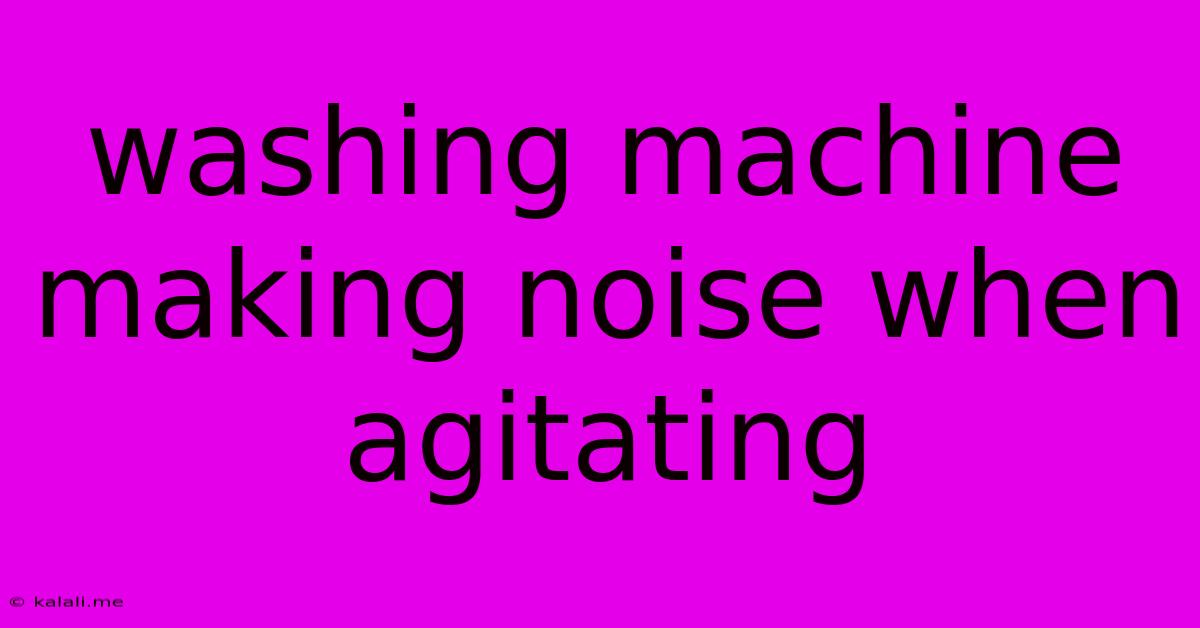Washing Machine Making Noise When Agitating
Kalali
May 27, 2025 · 3 min read

Table of Contents
Washing Machine Making Noise When Agitating? Troubleshooting Common Causes
Is your washing machine making a racket during the agitation cycle? A noisy washing machine can be incredibly frustrating, but before you call a repairman, let's troubleshoot some common causes. This guide will walk you through identifying the source of the noise and potential solutions, saving you time and money. Understanding the root of the problem will help you determine whether you can fix it yourself or if professional help is needed.
Understanding Washing Machine Agitation Noise
The agitation cycle is where your washing machine's internal components work hardest, mixing clothes and water for optimal cleaning. Excessive noise during this phase often points to a problem with these components: the motor, bearings, tub, or even improperly balanced loads.
Common Causes of Noisy Agitation and How to Fix Them
Let's dive into the most common culprits behind a noisy washing machine during agitation:
1. Unbalanced Load: This is often the simplest and easiest fix. An uneven distribution of laundry within the drum can cause a significant thumping or banging sound.
- Solution: Before starting a wash, ensure your clothes are evenly distributed. Try rearranging items manually after the machine begins filling. Avoid overloading the machine – stick to the manufacturer's recommended load size. For smaller loads, use the correct wash setting to prevent excessive noise.
2. Worn-out Bearings: This is a more serious issue. Bearings support the inner drum's rotation, and when worn, they can create grinding, squealing, or rumbling noises, particularly during agitation.
- Solution: Worn bearings usually require professional repair or replacement. The cost can vary depending on the washing machine model and accessibility of parts. Ignoring this could lead to further damage and even motor failure.
3. Loose or Damaged Parts: Over time, screws, bolts, or other internal parts can become loose or damaged. This can cause rattling, clanging, or knocking sounds.
- Solution: Carefully inspect the washing machine's exterior for any loose panels or parts. If you're comfortable working with appliances, you may be able to tighten loose screws or bolts. However, if you are unfamiliar with appliance repair, it's best to consult a professional.
4. Motor Problems: A failing motor can generate a variety of unusual noises, including humming, grinding, or whining, especially during high-energy cycles like agitation.
- Solution: Motor problems usually require professional attention. It's crucial to diagnose the exact problem to determine if the motor needs repair or complete replacement. Delaying this could cause more extensive damage.
5. Problems with the Tub: A cracked or damaged washing machine tub can cause banging or rattling sounds. The tub is a core component of the machine, so this is often a major issue.
- Solution: A cracked or damaged tub usually requires professional repair or replacement. This is often an expensive repair, so consider the cost compared to the cost of a new machine.
6. Foreign Objects: Sometimes, small items like coins, buttons, or other hard objects can get lodged in the washing machine's mechanisms. This will create unusual banging or knocking sounds.
- Solution: Check the filter or drain hose for any trapped items. Depending on the washing machine model, you may need to carefully disassemble parts to remove stubborn objects. Preventative measures, like checking pockets thoroughly before washing, can avoid future problems.
Preventing Washing Machine Noise
Proactive maintenance is key to avoiding costly repairs. Here are some preventative measures:
- Regular Cleaning: Clean the lint filter after every wash cycle and deep clean your machine periodically to remove built-up detergent and dirt.
- Leveling: Ensure your washing machine is properly leveled to minimize vibrations and noise.
- Proper Loading: Avoid overloading the machine and always distribute laundry evenly.
- Check Hoses and Connections: Ensure that all hoses and connections are secure and in good condition.
By systematically checking these potential issues, you'll increase your chances of quickly identifying and resolving the source of your noisy washing machine. Remember, if you're unsure about any repair attempt, it's always best to contact a qualified appliance technician. They can accurately diagnose the problem and perform the necessary repairs safely and effectively.
Latest Posts
Latest Posts
-
How To Remove Bathroom Exhaust Fan
May 27, 2025
-
How Long For Pipes To Thaw Naturally
May 27, 2025
-
What Size Breaker For Mini Split
May 27, 2025
-
How To Clean Rusty Grill Grates
May 27, 2025
-
Ae Systome Cant Pull Items Out
May 27, 2025
Related Post
Thank you for visiting our website which covers about Washing Machine Making Noise When Agitating . We hope the information provided has been useful to you. Feel free to contact us if you have any questions or need further assistance. See you next time and don't miss to bookmark.